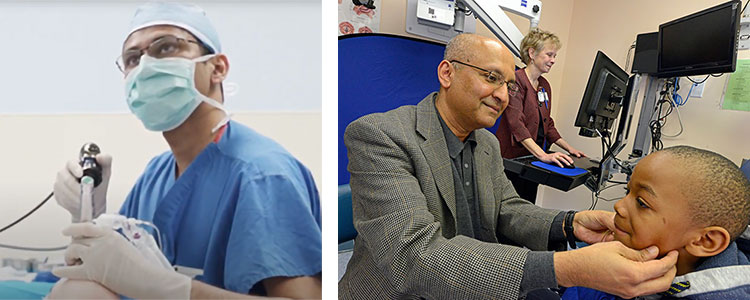Checking out the Field of Otolaryngology: What to Anticipate When You Speak With an ENT
Otolaryngology, frequently referred to as ENT, encompasses the diagnosis and treatment of nose, throat, and ear disorders. For those experiencing relevant problems, consulting an ENT expert can supply clearness and relief. Recognizing what to expect during such appointments is vital for efficient communication and care. This overview will certainly lay out key aspects of the ENT experience, including typical reasons for sees and the procedures involved in diagnosis and therapy.

Understanding Otolaryngology: A Review
Otolaryngology, frequently described as ENT (Ear, Nose, and Throat) medicine, is a customized branch of medicine that focuses on the diagnosis and therapy of problems influencing these essential areas of the human body. This area includes a wide variety of problems, consisting of those pertaining to hearing, equilibrium, breathing function, and speech. Otolaryngologists are educated to manage both clinical and medical therapies, utilizing sophisticated methods and technologies. Their experience extends past traditional ailments, dealing with concerns such as allergies, sinus infections, and hearing loss. In addition, they play a vital duty in the administration of head and neck cancers cells, supplying complete care customized to specific person demands. Overall, otolaryngology stays essential for preserving health and top quality of life in damaged people.
Typical Factors to See an ENT Specialist
Many individuals seek the experience of an ENT specialist for a range of reasons, showing the varied nature of conditions that affect the throat, ear, and nose. Typical concerns consist of persistent sinus problems, which frequently causes persistent nasal congestion and face pain. Allergies and their connected symptoms, such as itching and sneezing, additionally prompt check outs to these professionals (ENT). Hearing loss, whether steady or sudden, is another significant factor for examination. On top of that, individuals may seek evaluation for throat disorders, including persistent hoarseness or swallowing troubles. Rest apnea, defined by disturbed breathing during rest, is regularly addressed by ENT specialists. Each of these conditions highlights the significance of specialized treatment in handling intricate ENT-related wellness problems
Getting ready for Your ENT Appointment
When getting ready for an ENT appointment, it is vital to gather pertinent details and take into consideration any kind of certain concerns. People should compile a thorough medical history, consisting of previous ear, nose, or throat issues, surgeries, and existing drugs. Recording signs and symptoms-- such as frequency, seriousness, and duration-- can provide useful insights for the ENT expert. Additionally, people ought to prepare a listing of questions they wish to ask, guaranteeing that all issues are addressed throughout the browse through. Bringing along any kind of pertinent clinical documents or test results can even more help the ENT in understanding the individual's problem. Clients should validate their appointment details, consisting of time, area, and date, to minimize any final confusion. Correct prep work can boost the effectiveness of the examination and bring about better end results.
What to Anticipate During the Assessment
As the examination starts, the patient can expect to participate in a detailed conversation with the ENT specialist concerning their signs and case history. The specialist will ask about the duration, regularity, and severity of signs such as hearing loss, nasal blockage, or sore throat. In addition, the person's previous medical conditions, medications, and any kind of relevant family background will certainly be reviewed, aiding the expert in developing a complete understanding of the client's health and wellness. The ENT might additionally inquire about lifestyle elements, such as direct exposure to allergens or toxic irritants. This open dialogue establishes a structure for the examination, ensuring that the individual's problems are dealt with and establishing the phase for any essential assessments or referrals for treatment.
Analysis Tests and Treatments in Otolaryngology
A range of diagnostic examinations and procedures are crucial in otolaryngology to properly examine and identify conditions impacting the nose, throat, and ear. Common examinations include audiometry, which gauges hearing feature, and tympanometry, analyzing middle ear pressure. Nasal endoscopy permits visualization of the nasal flows and sinuses, while laryngoscopy examines the throat and vocal cords. Imaging strategies, such as CT scans and MRIs, offer in-depth sights of head and neck frameworks. Allergic reaction testing may also be conducted to determine triggers for sinus or respiratory concerns. These analysis tools make it possible for ENT specialists to create a detailed understanding of people' problems, guaranteeing customized and efficient monitoring strategies. Correct medical diagnosis is necessary for effective treatment outcomes in otolaryngology.
Therapy Choices Supplied by ENT Specialists
ENT professionals supply a variety of treatment options customized to address certain conditions affecting the ear, throat, and nose. These treatments range from conservative techniques, such as drug and way of living alterations, to even more invasive procedures. For instance, allergic reactions might be handled with antihistamines or immunotherapy, while chronic sinusitis may need nasal corticosteroids or sinus surgical procedure. For see this here hearing loss, ENT specialists often suggest listening device or medical interventions like cochlear implants. In instances of throat disorders, choices can include speech therapy or operations to remove obstructions. Furthermore, they may supply support for handling rest apnea, consisting of making use of CPAP tools or surgical interventions. In general, the objective is to enhance individuals' lifestyle with individualized treatment and efficient therapy methods.
When to Seek Follow-Up Care With an ENT
When to seek follow-up care with an ENT specialist is important for managing continuous signs and symptoms or complications connected to ear, throat, and nose conditions, identifying. Individuals must consider scheduling a follow-up appointment if symptoms continue despite preliminary treatment, such as persistent ear discomfort, nasal congestion, or throat discomfort. Changes in hearing, balance concerns, or uncommon nasal discharge might likewise require more examination. Additionally, if a person experiences negative effects you could try here from recommended medicines or has undertaken a procedure, follow-up treatment is necessary to keep track of recovery and attend to any type of problems. Timely assessments dartmouth otolaryngology can guarantee reliable monitoring of problems, prevent prospective problems, and supply assurance pertaining to one's wellness. Seeking follow-up care advertises proactive health and wellness monitoring in otolaryngology.
Regularly Asked Concerns

What Credentials Should I Seek in an ENT Specialist?
When seeking an ENT professional, one should try to find board accreditation, appropriate experience, and solid person evaluations. Furthermore, efficient communication abilities and a thoughtful strategy can greatly enhance the total therapy experience.
Just how Do I Choose the Right ENT for My Requirements?
Selecting the best ENT specialist includes evaluating their credentials, experience, and patient evaluations (Voice). It is important to ponder their interaction style and technique to treatment, ensuring they straighten with the person's certain wellness needs and preferences
Are There Any Dangers Connected With ENT Procedures?
The risks connected with ENT treatments may consist of infection, blood loss, anesthetic complications, and potential damages to bordering frameworks. People ought to talk about these risks with their doctor to recognize specific worries and guarantee educated decisions.
How Can I Take Care Of Anxiety Prior To My ENT Consultation?
To manage stress and anxiety before a visit, people can practice deep breathing workouts, envision positive end results, prepare questions ahead of time, and seek assistance from close friends or family members, promoting a feeling of reassurance and calmness.
What Should I Do if I Experience Adverse Effects From Treatment?
The individual must immediately report them to their medical care copyright if side effects from treatment happen. Modifications to treatment or additional treatments might be necessary to ensure security and performance in managing their condition - Otolaryngologist. As the consultation starts, the person can expect to involve in an extensive conversation with the ENT expert concerning their signs and medical history. These diagnostic devices enable ENT experts to develop a complete understanding of people' problems, making certain tailored and reliable administration strategies. ENT experts provide a range of treatment choices customized to deal with specific conditions affecting the ear, throat, and nose. When looking for an ENT expert, one should look for board certification, appropriate experience, and solid individual testimonials. Picking the appropriate ENT expert includes examining their credentials, experience, and client testimonials